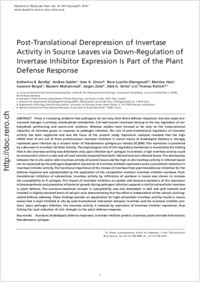Post-translational derepression of invertase activity in source leaves via down-regulation of invertase inhibitor expression is part of the plant defense response
- Bonfig, Katharina B. Julius-von-Sachs-Institut fuer Biowissenschaften, Lehrstuhl für Pharmazeutische Biologie, Universitaet Wuerzburg, Germany
- Gabler, Andrea Julius-von-Sachs-Institut fuer Biowissenschaften, Lehrstuhl für Pharmazeutische Biologie, Universitaet Wuerzburg, Germany
- Simon, Uwe K. Institute of Plant Sciences, Department of Plant Physiology, University of Graz, Austria
- Luschin-Ebengreuth, Nora Institute of Plant Sciences, Department of Plant Physiology, University of Graz, Austria
- Hatz, Martina Zentrum für medizinische Grundlagenforschung (ZMF), Medizinische Universität Graz, Austria
- Berger, Susanne Julius-von-Sachs-Institut fuer Biowissenschaften, Lehrstuhl für Pharmazeutische Biologie, Universitaet Wuerzburg, Germany
- Muhammad, Naseem Julius-von-Sachs-Institut fuer Biowissenschaften, Lehrstuhl für Pharmazeutische Biologie, Universitaet Wuerzburg, Germany
- Zeier, Jürgen Department of Biology, Plant Biology Section, University of Fribourg, Switzerland
- Sinha, Alok K. National Institute for Plant Genome Research, New Delhi, India
- Roitsch, Thomas Institute of Plant Sciences, Department of Plant Physiology, University of Graz, Austria
-
10.09.2010
Published in:
- Molecular Plant. - 2010, vol. 3, no. 6, p. 1037-1048
English
There is increasing evidence that pathogens do not only elicit direct defense responses, but also cause pronounced changes in primary carbohydrate metabolism. Cell-wall-bound invertases belong to the key regulators of carbohydrate partitioning and source-sink relations. Whereas studies have focused so far only on the transcriptional induction of invertase genes in response to pathogen infection, the role of post-translational regulation of invertase activity has been neglected and was the focus of the present study. Expression analyses revealed that the high mRNA level of one out of three proteinaceous invertase inhibitors in source leaves of Arabidopsis thaliana is strongly repressed upon infection by a virulent strain of Pseudomonas syringae pv. tomato DC3000. This repression is paralleled by a decrease in invertase inhibitor activity. The physiological role of this regulatory mechanism is revealed by the finding that in situ invertase activity was detectable only upon infection by P. syringae. In contrast, a high invertase activity could be measured in vitro in crude and cell wall extracts prepared from both infected and non-infected leaves. The discrepancy between the in situ and in vitro invertase activity of control leaves and the high in situ invertase activity in infected leaves can be explained by the pathogen-dependent repression of invertase inhibitor expression and a concomitant reduction in invertase inhibitor activity. The functional importance of the release of invertase from post-translational inhibition for the defense response was substantiated by the application of the competitive chemical invertase inhibitor acarbose. Post-translational inhibition of extracellular invertase activity by infiltration of acarbose in leaves was shown to increase the susceptibility to P. syringae. The impact of invertase inhibition on spatial and temporal dynamics of the repression of photosynthesis and promotion of bacterial growth during pathogen infection supports a role for extracellular invertase in plant defense. The acarbose-mediated increase in susceptibility was also detectable in sid2 and cpr6 mutants and resulted in slightly elevated levels of salicylic acid, demonstrating that the effect is independent of the salicylic acid-regulated defense pathway. These findings provide an explanation for high extractable invertase activity found in source leaves that is kept inhibited in situ by post-translational interaction between invertase and the invertase inhibitor proteins. Upon pathogen infection, the invertase activity is released by repression of invertase inhibitor expression, thus linking the local induction of sink strength to the plant defense response.
- Faculty
- Faculté des sciences et de médecine
- Department
- Département de Biologie
- Language
-
- English
- Classification
- Biological sciences
- License
-
License undefined
- Identifiers
-
- RERO DOC 20540
- DOI 10.1093/mp/ssq053
- Persistent URL
- https://folia.unifr.ch/unifr/documents/301622
Statistics
Document views: 125
File downloads:
- pdf: 275
